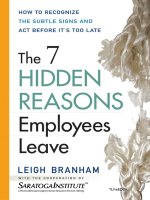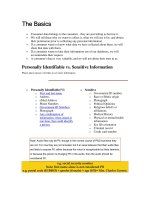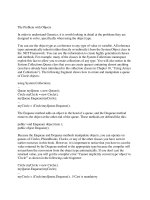Tài liệu The Millionaire Next Door docx
Bạn đang xem bản rút gọn của tài liệu. Xem và tải ngay bản đầy đủ của tài liệu tại đây (118.7 KB, 14 trang )
The Millionaire Next Door: The
Surprising Secrets of American's
Wealthy
By THOMAS J. STANLEY, Ph.D and WILLIAM D. DANKO, Ph.D
Longstreet Press
CHAPTER ONE
Meet the Millionaire Next Door
These people cannot be millionaires! They don't look like millionaires, they don't
dress like millionaires, they don't eat like millionaires, they don't act like
millionaires--they don't even have millionaire names. Where are the millionaires
who look like millionaires?
The person who said this was a vice president of a trust department. He made these
comments following a focus group interview and dinner that we hosted for ten first-
generation millionaires. His view of millionaires is shared by most people who are not
wealthy. They think millionaires own expensive clothes, watches, and other status artifacts.
We have found this is not the case.
As a matter of fact, our trust officer friend spends significantly more for his suits than the
typical American millionaire. He also wears a $5,000 watch. We know from our surveys
that the majority of millionaires never spent even one-tenth of $5,000 for a watch. Our
friend also drives a current-model imported luxury car. Most millionaires are not driving
this year's model. Only a minority drive a foreign motor vehicle. An even smaller minority
drive foreign luxury cars. Our trust officer leases, while only a minority of millionaires
ever lease their motor vehicles.
But ask the typical American adult this question: Who looks more like a millionaire?
Would it be our friend, the trust officer, or one of the people who participated in our
interview? We would wager that most people by a wide margin would pick the trust
officer. But looks can be deceiving.
This concept is perhaps best expressed by those wise and wealthy Texans who refer to our
trust officer's type as
Big Hat No Cattle
We first heard this expression from a thirty-five-year-old Texan. He owned a very
successful business that rebuilt large diesel engines. But he drove a ten-year-old car and
wore jeans and a buckskin shirt. He lived in a modest house in a lower-middle-class area.
His neighbors were postal clerks, firemen, and mechanics.
After he substantiated his financial success with actual numbers, this Texan told us:
[My] business does not look pretty. I don't play the part . . . don't act it.... When my British
partners first met me, they thought I was one of our truck drivers.... They looked all over
my office, looked at everyone but me. Then the senior guy of the group said, "Oh, we
forgot we were in Texas!" I don't own big hats, but I have a lot of cattle.
PORTRAIT Of A MILLIONAIRE
Who is the prototypical American millionaire? What would he tell you about himself?(*)
* I am a fifty-seven-year-old male, married with three children. About 70 percent of us earn
80 percent or more of our household's income.
* About one in five of us is retired. About two-thirds of us who are working are self-
employed. Interestingly, self-employed people make up less than 20 percent of the workers
in America but account for two-thirds of the millionaires. Also, three out of four of us who
are self-employed consider ourselves to be entrepreneurs. Most of the others are self-
employed professionals, such as doctors and accountants.
* Many of the types of businesses we are in could be classified as dullnormal. We are
welding contractors, auctioneers, rice farmers, owners of mobile-home parks, pest
controllers, coin and stamp dealers, and paving contractors.
* About half of our wives do not work outside the home. The number-one occupation for
those wives who do work is teacher.
* Our household's total annual realized (taxable) income is $131,000 (median, or 50th
percentile), while our average income is $247,000. Note that those of us who have incomes
in the $500,000 to $999,999 category (8 percent) and the $1 million or more category (5
percent) skew the average upward.
* We have an average household net worth of $3.7 million. Of course, some of our cohorts
have accumulated much more. Nearly 6 percent have a net worth of over $10 million.
Again, these people skew our average upward. The typical (median, or 50th percentile)
millionaire household has a net worth of $1.6 million.
* On average, our total annual realized income is less than 7 percent of our wealth. In other
words, we live on less than 7 percent of our wealth.
* Most of us (97 percent) are homeowners. We live in homes currently valued at an
average of $320,000. About half of us have occupied the same home for more than twenty
years. Thus, we have enjoyed significant increases in the value of our homes.
* Most of us have never felt at a disadvantage because we did not receive any inheritance.
About 80 percent of us are first-generation affluent.
* We live well below our means. We wear inexpensive suits and drive American-made
cars. Only a minority of us drive the current-model-year automobile. Only a minority ever
lease our motor vehicles.
* Most of our wives are planners and meticulous budgeters. In fact, only 18 percent of us
disagreed with the statement "Charity begins at home." Most of us will tell you that our
wives are a lot more conservative with money than we are.
* We have a "go-to-hell fund." In other words, we have accumulated enough wealth to live
without working for ten or more years. Thus, those of us with a net worth of $1.6 million
could live comfortably for more than twelve years. Actually, we could live longer than that,
since we save at least 15 percent of our earned income.
* We have more than six and one-half times the level of wealth of our nonmillionaire
neighbors, but, in our neighborhood, these nonmillionaires outnumber us better than three
to one. Could it be that they have chosen to trade wealth for acquiring high-status material
possessions?
* As a group, we are fairly well educated. Only about one in five are not college graduates.
Many of us hold advanced degrees. Eighteen percent have master's degrees, 8 percent law
degrees, 6 percent medical degrees, and 6 percent Ph.D.s.
* Only 17 percent of us or our spouses ever attended a private elementary or private high
school. But 55 percent of our children are currently attending or have attended private
schools.
* As a group, we believe that education is extremely important for ourselves, our children,
and our grandchildren. We spend heavily for the educations of our offspring.
* About two-thirds of us work between forty-five and fifty-five hours per week.
* We are fastidious investors. On average, we invest nearly 20 percent of our household
realized income each year. Most of us invest at least 15 percent. Seventy-nine percent of us
have at least one account with a brokerage company. But we make our own investment
decisions.
* We hold nearly 20 percent of our household's wealth in transaction securities such as
publicly traded stocks and mutual funds. But we rarely sell our equity investments. We
hold even more in our pension plans. On average, 21 percent of our household's wealth is
in our private businesses.
* As a group, we feel that our daughters are financially handicapped in comparison to our
sons. Men seem to make much more money even within the same occupational categories.
That is why most of us would not hesitate to share some of our wealth with our daughters.
Our sons, and men in general, have the deck of economic cards stacked in their favor. They
should not need subsidies from their parents.
* What would be the ideal occupations for our sons and daughters? There are about 3.5
millionaire households like ours. Our numbers are growing much faster than the general
population. Our kids should consider providing affluent people with some valuable service.
Overall, our most trusted financial advisors are our accountants. Our attorneys are also very
important. So we recommend accounting and law to our children. Tax advisors and estate-
planning experts will be in big demand over the next fifteen years.
* I am a tightwad. That's one of the main reasons I completed a long questionnaire for a
crispy $1 bill. Why else would I spend two or three hours being personally interviewed by
these authors? They paid me $100, $200, or $250. Oh, they made me another offer--to
donate in my name the money I earned for my interview to my favorite charity. But I told
them, "I am my favorite charity."
"WEALTHY" DEFINED
Ask the average American to define the term wealthy. Most would give the same definition
found in Webster's. Wealthy to them refers to people who have an abundance of material
possessions.
We define wealthy differently. We do not define wealthy, affluent, or rich in terms of
material possessions. Many people who display a high-consumption lifestyle have little or
no investments, appreciable assets, income-producing assets, common stocks, bonds,
private businesses, oil/gas rights, or timber land. Conversely, those people whom we define
as being wealthy get much more pleasure from owning substantial amounts of appreciable
assets than from displaying a high-consumption lifestyle.
THE NOMINAL DEFINITION OF WEALTHY
One way we determine whether someone is wealthy or not is based on net worth--"cattle,"
not "chattel." Net worth is defined as the current value of one's assets less liabilities
(exclude the principle in trust accounts). In this book we define the threshold level of being
wealthy as having a net worth of $1 million or more. Based on this definition, only 3.5
million (3.5 percent) of the 100 million households in America are considered wealthy.
About 95 percent of millionaires in America have a net worth of between $1 million and
$10 million. Much of the discussion in this book centers on this segment of the population.
Why the focus on this group? Because this level of wealth can be attained in one
generation. It can be attained by many Americans.
HOW WEALTHY SHOWED YOU BE?
Another way of defining whether or not a person, household, or family is wealthy is based
on one's expected level of net worth. A person's income and age are strong determinants of
how much that person should be worth. In other words, the higher one's income, the higher
one's net worth is expected to be (assuming one is working and not retired). Similarly, the
longer one is generating income, the more likely one will accumulate more and more
wealth. So higher-income people who are older should have accumulated more wealth than
lower-income producers who are younger.
For most people in America with annual realized incomes of $50,000 or more and for most
people twenty-five to sixty-five years of age, there is a corresponding expected level of
wealth. Those who are significantly above this level can be considered wealthy in relation
to others in their income/age cohort.
You may ask: How can someone be considered wealthy if, for example, he is worth only
$460,000? After all, he's not a millionaire. Charles Bobbins is a forty-one-year-old fireman.
His wife is a secretary. They have a combined annual income of $55,000. According to our
research findings, Mr. Bobbins should have a net worth of approximately $225,500. But he
is worth much more than others in his income/age category. Mr. and Mrs. Bobbins have
been able to accumulate an above-average amount of net worth. Thus, they apparently
know how to live on a fireman's and secretary's income and still save and invest a good bit.
They likely have a low-consumption lifestyle. And given this lifestyle, Mr. Bobbins could
sustain himself and his family for ten years without working. Within their income and age
categories, the Bobbinses are wealthy.
The Bobbinses are quite different from John J. Ashton, M.D., age fifty-six, who has an
annual income of approximately $560,000. How much is Dr. Ashton worth? Is he wealthy?
According to one definition, he is, since his net worth is $1.1 million. But he is not wealthy
according to our other definition. Given his age and income, he should be worth more than
$3 million.
With his high-consumption lifestyle, how long do you think Dr. Ashton could sustain
himself and his family if he were no longer employed? Perhaps for two, at most three,
years.
HOW TO DETERMINE IF YOU'RE WEALTHY
Whatever your age, whatever your income, how much should you be worth right now?
From years of surveying various high-income/high-net worth people, we have developed
several multivariate-based wealth equations. A simple rule of thumb, however, is more
than adequate in computing one's expected net worth.









